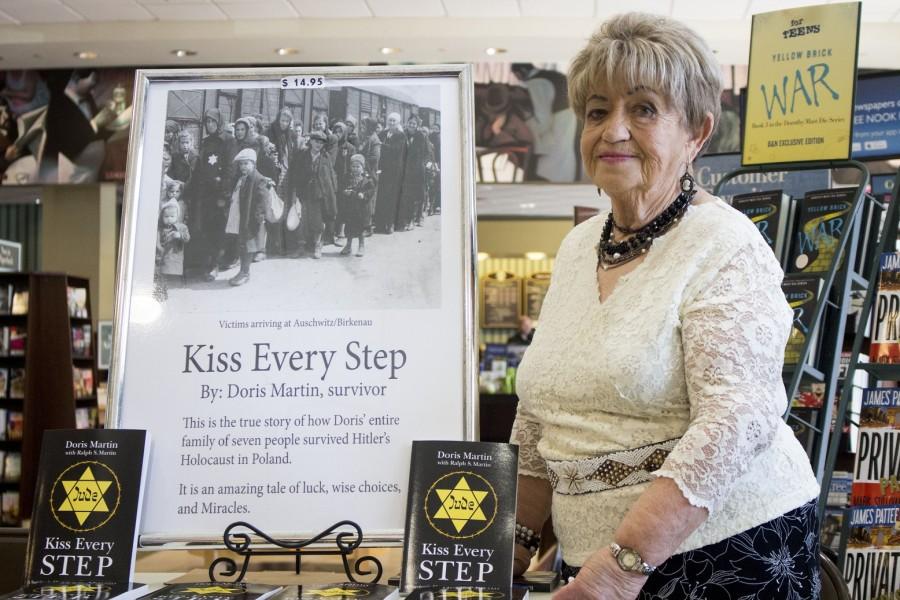Author Spotlight: Doris Martin
Holocaust survivor shares details of her memoir
March 30, 2016
At 90 years old, Doris Martin is still dreaming of sharing her message of peace and telling the story of how her family of seven survived the Holocaust.
“Kiss Every Step” is Martin’s memoir about her family’s survival. Martin frequently visits the Escondido Barnes and Noble to share her story with anyone willing to listen.
“When the Germans came to Poland, it was 1939, and the first days they started to go to people’s houses, take them out and take them to a big synagogue…they burned the synagogue with the people in it,” said Martin.
Martin lived among this brutality in Bendzin, Poland, where her family owned a shoe shop. After the Nazi invasion, her family lost their business and was bound by restrictions under Nazi rule.
“We could only be [out] from 6 o’clock in the morning to 6 o’clock in the evening. And if they caught us on the streets, they’d kill us…It was like a warning to everybody,” said Martin.
Martin’s family heard that her name was among a list of Jewish people the Germans were rounding up for the camps because “the young ones could work,” so they prepared for the day they’d come looking for her. She was just 16 years old in 1942 when they heard that grim knock on the door.
“My brother made me a special hiding place in the oven so they couldn’t find me…The next time they said I better be home,” said Martin. “They came the next time, they looked around, they couldn’t find me. So they took my mother and they beat her and took her.”
In her memoir, Martin writes that her father was able to track down her mother and found that she was near the train tracks with others who were bound for the train to Auschwitz. Her family decided to have her go in place of her, as younger kids were more fit to endure hard labor.
“Had we been caught in any deception we all might have been transported to Auschwitz,” she writes in her memoir.
In making this sacrifice, Martin never found out if her mother made it back to the rest of her family before she left for Auschwitz. Her sacrifice led to harsh circumstances.
“I never had a childhood or teenage life. I was in the concentration camps,” she said. “You could not be sick. If you were sick, they killed you…you had to survive.”
She survived on one slice of bread a day.
“We were very undernourished. I think I might have weighed 60 pounds,” said Martin.
In January 1942, when she was 17, the Soviets liberated Auschwitz.
“When I went back, nobody was living in my place anymore,” said Martin. “ I went back to the concentration camp…because I didn’t have any place to stay. In the concentration camp, at least they gave me something to eat.”
Martin said she started writing her story about this experience about four or five years ago.
“We couldn’t write it [at first] because it was very painful for us to go through,” she said.
She traveled back to her hometown with her husband, Ralph Martin, and Dr. Gregory Larkin of Northern Arizona University to start writing the book.
Her story is included in the Holocaust museums in Los Angeles and D.C., and she personally shares her story with students in K-12 public schools and universities in the local area, causing them to think twice about their lives.
“I get back letters from students about how they changed, how their problems…can be worse,” said Martin.
Describing her family’s survival as miraculous, Martin said the story must be shared.
“Maybe sometime in the future, they’re going to make a movie out of this,” she said. ”My family survived and so I wrote this book [about] how we went through Hitler, Nazis, and we were still coming back together. And that was a blessing. God let me have my family.”







Bill Mason • Jun 7, 2022 at 12:36 pm
I’m in Escondido Ca. for a couple weeks and found your book. Is there a way I could get it signed?
Julianne Palma • Sep 21, 2021 at 9:54 am
Is Mrs. Doris Martin still alive? Would like to have her come speak to the Rotary Club in San Marcos.
831-245-8491